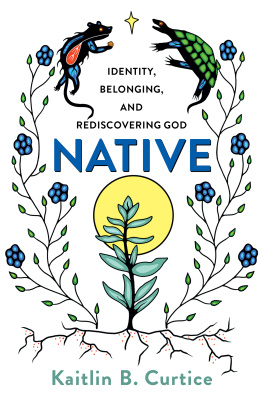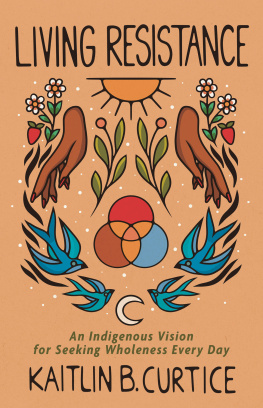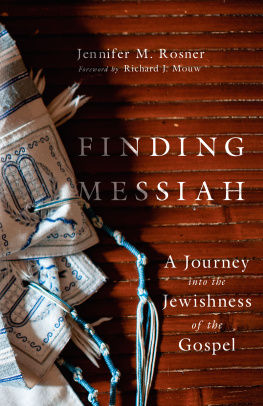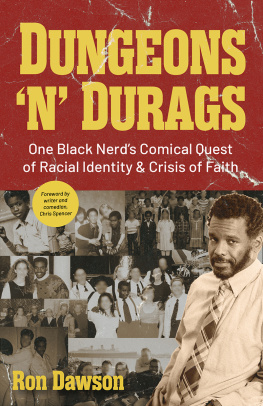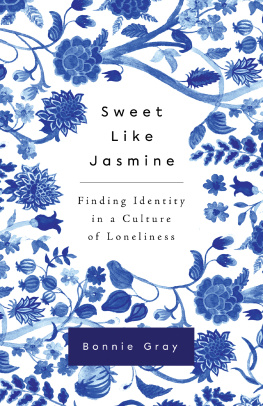Endorsements
Native is both an expansive meditation on faith through a Potawatomi lens and a powerful vision of living in relationship with divinity and in the worldone that is urgently needed today. Curtice is an essential voice.
Rabbi Danya Ruttenberg , author of Surprised by God and Nurture the Wow
It isnt very often that a book about identitylet alone dismantling white supremacy and patriarchyreads like a poem, but thats Kaitlin. She is thoughtful decolonization set to music and wrapped in love. Her story is compelling and healing, and her path is an invitation to all of us, even as she challenges our assumptions and imaginations. I treasure each of these sacred words, rooted in her story and in the larger stories we still carry. This book can make all of us both more free and more connected to one another.
Sarah Bessey , author of Miracles and Other Reasonable Things and Jesus Feminist
There is no doubt Christianity has been the handmaiden to the destruction of Indigenous nations. Native is more than Kaitlin Curtices testament. It is an indigenization of faith and, more important, a moral call not only for the Christian church but for everyone to reckon with the genocidal legacies of US settler colonialism and African slavery. As she humbly puts it, decolonization is an invitation and a gift for humankind to re-establish correct relations with each otherand the earth.
Nick Estes , cofounder of The Red Nation and author of Our History Is the Future: Standing Rock versus the Dakota Access Pipeline, and the Long Tradition of Indigenous Resistance
In the pages of Native , Kaitlin B. Curtice is a poet, professor, storyteller, and unapologetic truth-teller. This book is required reading for all those committed to learning the truth about the land we live on and the institutions we live inside of. It both stretched me and comforted meit called me out and called me home. Curtice is a vital artist and teacher, and Native is her most important offering yet. It will remain on my shelf forever.
Glennon Doyle , author of Untamed and founder of Together Rising
In Native , Curtice reminds us why our humanity mattersto explore the divine, to practice solidarity with one another, and to learn to be humble caretakers of this world. She is a brave truth-teller and a prophetic voice we need to be listening to, and Native is a book that will guide us toward a better future.
Richard Rohr, OFM , Center for Action and Contemplation
In Native , Curtice takes the reader along as she bravely weaves together her spiritual, tribal, religious, cultural, and familial history into a cord that anchors her as she makes sense of her self, her world, and her identity. After reading this book, I may just touch a tree now and again and see it as prayer. Im so grateful for Curtices voice.
Nadia Bolz- Weber , bestselling author, speaker, and public theologian
Half Title Page
Title Page
Copyright Page
2020 by Kaitlin B. Curtice
Published by Brazos Press
a division of Baker Publishing Group
PO Box 6287, Grand Rapids, MI 49516-6287
www.brazospress.com
Ebook edition created 2020
All rights reserved. No part of this publication may be reproduced, stored in a retrieval system, or transmitted in any form or by any meansfor example, electronic, photocopy, recordingwithout the prior written permission of the publisher. The only exception is brief quotations in printed reviews.
Library of Congress Cataloging-in-Publication Data is on file at the Library of Congress, Washington, DC.
ISBN 978-1-4934-2202-9
Any poetry not otherwise attributed belongs to the author.
Published in association with Books & Such Literary Management, 52 Mission Circle, Suite 122, PMB 170, Santa Rosa, CA 95409-5370, www.booksandsuch.com.
Dedication
for my ancestors
and the One
they always knew
and for
Rachel Held Evans,
who believed in me
and showed me
a vision of the church
worth believing in
Contents
Cover
Endorsements
Half Title Page
Title Page
Copyright Page
Dedication
Introduction
Part 1: Beginnings
1. Land and Water
2. Journeying Stories
3. Creation Stories
4. My Own Beginning
Part 2: Searching for Meaning
5. The Problem of Whiteness
6. Stereotypes and Survival
7. A Heart Language
8. Gifts of Prayer
Part 3: The Struggle for Truth
9. Ceremony
10. Ancestors
12. The Pain of Church Spaces
Part 4: Working
13. Wake-Up Calls
14. When the Church Gets to Work
15. Keeping Watch
16. Fighting Invisibility
Part 5: Bearing Fruit in a New World
17. Finding One Another
18. The Future of Decolonization
19. Returning
20. A New World for Our Children
Afterword
Acknowledgments
Notes
Back Cover
Introduction
W HEN YOU ARE BORN , you come into the world connected to somebody. Once that umbilical cord is severed, you become a little more distanced from the woman who birthed you, but your DNA still leaves an eternal fingerprint, your soul born to belong to this thing we call family. Sometimes those ties are broken, damaged, or met with challenges, but they are still there, asking us to look deeper, to remember how they formed us in our original state. Sometimes family becomes the people we choose, the people who move in and out of our lives to remind us that we are not alone, that we are beloved along the journey.
I was born in 1988 in an Indian hospital in Ada, Oklahoma, born to a quiet father who sang and played guitar and knew the Oklahoma red dirt we called home. I was also born a person of European descent to a mother who taught me to appreciate opera, the Eagles, and poetry in all its forms.
I was born into an America established by whiteness. While for generations, Black, Indigenous, and other people of color have struggled to be noticed, seen, and valued, we live in a nation that, from its origin, has given priority to people with white skin and Western European ancestry. Systems of whiteness, like white supremacy itself, reward those who invest in what whiteness produces: the idea that anyone who isnt white is less-than. Whiteness both forces people into assimilation and rewards those who stay assimilated . Much of my life has been dictated by this, and more so because I am a white-coded Potawatomi woman. But as an adult, after I married and had children, the need to know myself outside the language and control of whiteness became an urgent matter, because to know myself is to teach my children to know who they are, to journey together toward that wholeness.
On a walk one winter day, I realized that the deep roots of my identity were coming to the surface, making themselves known in my daily thoughts, actions, and life choices. I was choosing to look back and remember, to understand, to ask the questions I had never asked before.
I began the journey backward, which, for me, was the miraculous journey forward .
As I put roots into the ground, every step I take brings more roots up to accept and welcome me ininto my heritage and into the woman I am slowly becoming, even in this very moment. Those roots are embedded in the soil of who God is and who God has always been, in the moments when I call Papa or Kche Mnedo , when I whisper in Potawatomi, Migwetch, Mamogosnan. Thank you, Creator .
I walk with my sons across the Chattahoochee River Trail in Atlanta where we live, and we feel the mud pulse with memory. We feel the trees tell us stories of Muscogee Creek and Cherokee people, somehow, far across time and space and blood. They tell us stories of Natives, the original inhabitants, who walked this land and who walked with Creator . In our Native, or Indigenous, identities all over North America, we are diverse, unique, with histories, languages, and stories that belong to us as peoples.

